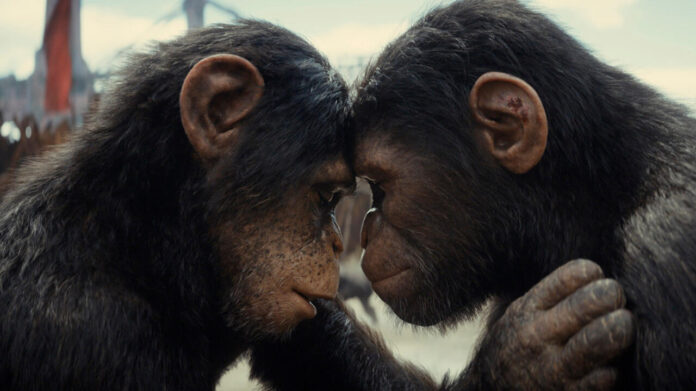Kingdom of the Planet of the Apes has been a tough movie for me to wrap my brain around. It works very well in a moment-to-moment way–the characters are interesting, the action is well-staged, and the world is a compelling one to learn about. But the plot parallels the story from War for the Planet of the Apes weirdly closely, and I’m not sure we ever actually see the kingdom that was promised by the title. This leaves us with a movie that’s entertaining but ultimately somewhat hollow.
Kingdom opens shortly after the events of War for the Planet of the Apes, at the darkly lit funeral for Caesar. It’s an almost ominous scene, calling to mind Queen Cersei’s spooky coronation on Game of Thrones, but it’s not long before it cuts to the title card and a time jump to “many generations later.”
Here, in this new ape-dominated future, we focus on a young ape named Noa (Owen Teague), who belongs to a group called the Eagle Clan–named so because each ape in the clan bonds with and raises an eagle that they form a lifelong partnership with. But Noa doesn’t get the chance to do that, because a chance encounter with a human woman (Freya Allen) quickly leads to an incursion by a group of scary, masked apes who are after her.
Thinking the Eagle Clan has the woman, these new apes invade their village in the name of Caesar, killing Noa’s father and taking everyone else into captivity–except for Noa himself, who is left for dead after trying to fight back.
But Noa survives and sets out after his clan. Along the way, he runs into an orangutan named Raka, a scholar who says those hostile apes have corrupted Caesar’s message of peace, and then together they have a proper meeting with the mysterious woman who’d been lurking around. It turns out that this one, unlike all the other humans these folks had met, is actually able to talk. This woman’s people were also killed by those hostile apes, and now she and Noa will have to team up if they’re going to get what they want.

And they’ll have to directly face their enemy, who calls himself Proximus Caesar and fashions himself a king. He and his forces are set up at a massive vault door at the entrance to an old US government shelter, having spent months trying to break in and get the advanced technology presumably preserved inside.
The best thing Kingdom of the Planet of the Apes has going for it is its characters. Noa is a nice, Luke Skywalker-ish centerpiece for the film who’s easy to get behind, but it’s the array of folks he meets that make it click. Raka, who’s responsible for filling in Noa, and us, on what’s been going on in the greater world, has the quality of a person you want to hear tell you stories–Peter Macon just has one of those voices, and the worldbuilding that he does is pretty compelling.
And Mae has this all-consuming air of sad determination about her that Allen is able to sell very convincingly. She’s a rare main character who’s miserable from beginning to end without having that misery ever be played for laughs.
But it’s Proximus Caesar, played by the always-fun Kevin Durand, who eventually dominates the film. Proximus gets a number of big soliloquies, as he tries to sell Noa and the other members of the Eagle Clan on his philosophy and his plan for apekind, and every second of them is a pleasure to watch. He makes a lot of good points, honestly, even if his methods are overly harsh. And Durand is an actor who knows how to chew the scenery well.
While Durand himself obviously deserves a lot of credit for his performance, we have to mention the motion-capture and facial-capture work by the visual FX artists at WETA Digital–in particular how well they’re able to translate the actors’ facial performances. The CGI work on the Planet of the Apes reboot series has been spectacular since the beginning, but it’s getting even more impressive as they allow the humanness to seep into the apes’ mannerisms and expressions.
As much as I wanted to love Kingdom of the Planet of the Apes, though, there’s something off about the story. The parallels to the last film are a little bit heavy–both movies are about a group of apes living happy, chill lives until a group of interlopers kidnap most of them, forcing the main character to chase after them and team up with an eclectic group of fellow outsiders along the way. The main change is just that, this time, the interlopers are also apes, but I’m not sure that’s enough of a twist to warrant all these parallels.
Further, that we never get to see where Proximus and his people actually live–his actual kingdom–makes it hard to get a sense of the big picture. Sure, Proximus has his little army, but does he truly have a kingdom? It’s impossible to say from watching this movie.
I’ve had a hard time figuring out how big of a gripe those issues really are for me, and it’ll probably take another viewing for me to make up my mind for sure. For now, I think Kingdom works pretty damn well thanks to that strong character work. Yes, it’s the sort of movie that will probably leave you with some unnecessarily nagging questions, but as an experience, it’s unique and well-constructed enough that I can overlook most of those issues.
Source: GameSpot


